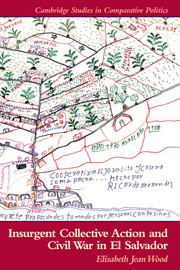Book contents
- Frontmatter
- Contents
- List of Illustrations and Tables
- Preface and Acknowledgments
- List of Abbreviations
- 1 THE PUZZLE OF INSURGENT COLLECTIVE ACTION
- 2 ETHNOGRAPHIC RESEARCH IN THE SHADOW OF CIVIL WAR
- 3 REDRAWING THE BOUNDARIES OF CLASS AND CITIZENSHIP
- 4 FROM POLITICAL MOBILIZATION TO ARMED INSURGENCY
- 5 THE POLITICAL FOUNDATIONS OF DUAL SOVEREIGNTY
- 6 THE REEMERGENCE OF CIVIL SOCIETY
- 7 CAMPESINO ACCOUNTS OF INSURGENT PARTICIPATION
- 8 EXPLAINING INSURGENT COLLECTIVE ACTION
- Epilogue: Legacies of an Agrarian Insurgency
- Appendix: A Model of High-Risk Collective Action by Subordinate Social Actors
- Chronology of El Salvador's Civil War
- References
- Index
- Other Books in the Series
Epilogue: Legacies of an Agrarian Insurgency
Published online by Cambridge University Press: 05 June 2012
- Frontmatter
- Contents
- List of Illustrations and Tables
- Preface and Acknowledgments
- List of Abbreviations
- 1 THE PUZZLE OF INSURGENT COLLECTIVE ACTION
- 2 ETHNOGRAPHIC RESEARCH IN THE SHADOW OF CIVIL WAR
- 3 REDRAWING THE BOUNDARIES OF CLASS AND CITIZENSHIP
- 4 FROM POLITICAL MOBILIZATION TO ARMED INSURGENCY
- 5 THE POLITICAL FOUNDATIONS OF DUAL SOVEREIGNTY
- 6 THE REEMERGENCE OF CIVIL SOCIETY
- 7 CAMPESINO ACCOUNTS OF INSURGENT PARTICIPATION
- 8 EXPLAINING INSURGENT COLLECTIVE ACTION
- Epilogue: Legacies of an Agrarian Insurgency
- Appendix: A Model of High-Risk Collective Action by Subordinate Social Actors
- Chronology of El Salvador's Civil War
- References
- Index
- Other Books in the Series
Summary
We shed blood all these years in order to buy land at market prices?
Campesino activist, Tierra Blanca, 1992In the course of El Salvador's civil war, insurgent campesinos redrew boundaries of class, culture, and citizenship. By the end of the war, insurgent cooperatives occupied about a third of Usulután's farmland. While desperately poor, insurgent campesinos in most of the case-study areas enjoyed an unprecedented autonomy from landlords and traditional authorities. They participated in a dense network of insurgent organizations that defended land occupations against the return of the landlords. The settlement that ended the civil war between the two parties was a democratic political bargain: in exchange for laying down their arms and abandoning their socialist objectives, the insurgent organization joined the polity, which was to be reformed along liberal democratic lines. Over the next several years, the provisions of the agreement were generally carried out, despite resistance on the part of the government to the implementation of some aspects of the agreement. That positive outcome required an extended process of negotiation and ongoing pressure on government officials (and to a lesser extent on the FMLN) by the United Nations in its role as observer and verifier of the peace agreement and by donor countries in their capacity as funders of reforms. Since 1994, elections have been held regularly and the FMLN has garnered an increasing share of political power, becoming the leading party in the national legislature in the 2000 elections.
- Type
- Chapter
- Information
- Insurgent Collective Action and Civil War in El Salvador , pp. 257 - 266Publisher: Cambridge University PressPrint publication year: 2003



